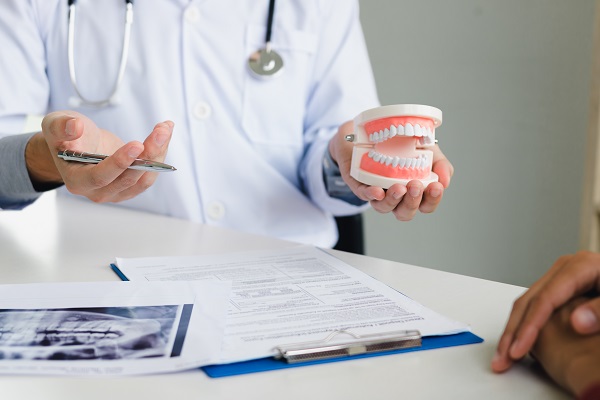When Is Oral Surgery for Sleep Apnea Recommended?

Sleep apnea is a condition in which breathing stops and starts again while asleep and can be treated by oral surgery. It affects more than 200,000 people in the United States each year. A minor case of sleep apnea can often be treated through lifestyle changes and a dental night guard. However, oral surgery for sleep apnea is also an option for more severe cases.
Oral surgery and sleep apnea
Oral surgery for sleep apnea is not as intimidating as it may sound. Learning more about the process of sleep apnea surgery and what the potential benefits are can help you decide if the treatment is a good option for you. The following is a complete review of how a dentist can help patients with severe sleep apnea through oral surgery treatment.
What is oral surgery for sleep apnea?
Oral surgery is a form of sleep apnea treatment. The goal of oral surgery for sleep apnea is to allow the patient to breathe better while they are asleep. There are several different methods of achieving this goal. Oral surgery is not required for all cases of sleep apnea.
In fact, many are able to find relief by simply making lifestyle changes and through the use of a continuous positive airway pressure (CPAP) device or dental nightguard for sleep apnea. However, those who are unable to get a good night’s sleep when wearing a device or find the devices to be ineffective may make a good candidate for sleep apnea treatment.
When to consider oral surgery for sleep apnea
As mentioned, oral surgery for sleep apnea is worth considering for anyone who is not happy with their current treatment plan, either because the results thus far have been unsuccessful or they prefer not to wear a dental device while they sleep. Patients should also discuss the potential risks of oral surgery for sleep apnea with their dentist before making a final decision, along with considering all available treatment options.
Different types of sleep apnea surgery
Dentists may recommend one of several different types of sleep apnea surgeries, depending on the exact concern that the patient has. Several common types of sleep apnea surgery include:
- UPPP
- Nasal surgery
- Hyoid suspension
- Palatal implants
- Tongue advancement
Most patients are unfamiliar with each type, so it is helpful to discuss all available options and become well informed on the recommended procedure before starting treatment.
What to expect during oral surgery
The patient’s overall experience is dictated by the specific type of oral surgery and the issue that they seek to address. In most cases, the surgical process itself is not painful, but there is a recovery period following the oral surgery. The dentist should provide clear preparation, day of procedure and aftercare instructions to help guide the patient through sleep apnea oral surgery.
Schedule a consultation visit with our friendly team
We understand that oral surgery can cause anxiety in many patients, and our friendly team can help you calm your nerves by providing answers to your questions and guiding you through each step of the treatment process.
Request an appointment here: https://thechesterfielddentist.com or call Chesterfield Dentist at (804) 412-0867 for an appointment in our Chester office.
Check out what others are saying about our services on Yelp: Read our Yelp reviews.
Recent Posts
People who are looking to improve their smiles often consider the various dental restorations that are available. These restorations can fix a number of issues, including missing, fractured, chipped, decayed, and weakened teeth. The purpose of the procedures is to improve not only the look of the teeth but also their function. Depending on the…
Gum disease treatment is an important part of comprehensive oral healthcare. A family dentist can address gum issues when they first appear, which can preserve your smile and improve your overall oral health. These dental professionals offer a variety of gum disease treatment options based on the stage and severity of the condition.Gum disease, medically…
Dental restorations include several fairly routine dental procedures and are therefore very common. Here is a description of dental restorations and some of the most frequently utilized types available in dental offices throughout the country today.Restorations are methods a dentist can employ to restore teeth to as close to their original state as possible and…
After getting dental restorations such as fillings, implants, crowns, or root canals, it is important to follow any aftercare instructions given by the dentist. Doing so can help avoid damaging the restoration and causing further harm to the mouth. It can also allow the mouth to heal quickly and properly. Here are some tips commonly…


